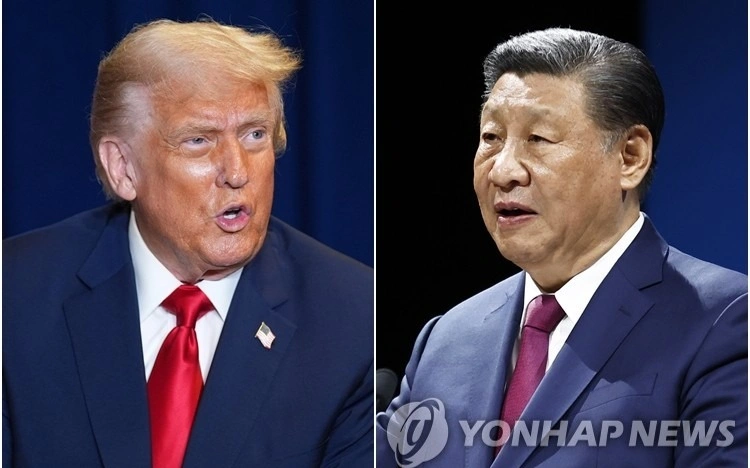APEC gathering to set stage for S. Korea's high-stakes talks with U.S., China as Trump, Xi visits lined up
Next week's Asia-Pacific Economic Cooperation (APEC) gathering in South Korea places Seoul at the center of high-stakes diplomacy, with both U.S. President Donald Trump and Chinese President Xi Jinping to join the talks on trade and growth, Yonhap reports.

The APEC summit will take place Friday and Saturday in the historic southeastern city of Gyeongju, bringing together leaders and representatives of 21 member economies, including the United States, China, Japan, Canada, Australia, New Zealand and Russia, as well as Taiwan and Hong Kong.
APEC represents 61 percent of the world in terms of gross domestic product and 50 percent of world trade, serving as a key regional multilateral forum on promoting trade and co-prosperity.
A ministerial meeting of top foreign and trade officials will be held before the leaders' summit, with sessions involving business leaders scheduled throughout the week.
This year's gathering gives President Lee Jae Myung a rare opportunity to engage both Trump and Xi on his home turf as Seoul is striving to hash out details of a trade deal with Washington to reduce U.S. tariffs and seeking to stably manage ties with Beijing.
The presidential office said the two leaders will both pay state visits to South Korea on the occasion of the APEC forum.
Lee will hold talks with Trump on Wednesday and with Xi on Saturday, the office said.
The White House also announced earlier Trump's plan for talks with Lee, as well as with Xi on Thursday, making his plan official for a two-day visit to Korea.
The upcoming Lee-Trump talks, their second in about two months, draw attention to whether a breakthrough can be reached on a final trade deal implementing South Korea's US$350 billion investment pledge.
South Korea has committed to making the investment in return for the U.S. lowering the tariffs on South Korean goods from 25 percent to 15 percent.
Lee's top officials, including chief policy aide Kim Yong-beom and Industry Minister Kim Jung-kwan, have traveled to Washington multiple times in recent weeks, fueling speculation that the two sides are nearing a breakthrough in the tariff talks.
Upon his return from his trip to Washington on Friday, Kim said the two sides remain "far apart" over some sticking points, suggesting that having a final deal ready before the APEC meeting may not be easy.
If they have the deal by then, the two countries are expected to issue a separate statement on "modernizing the alliance," outlining a framework for increasing South Korea's defense spending, revising their bilateral nuclear energy pact and addressing other pending issues.
In the talks with Xi, Lee is expected to use the opportunity to cement the basis for a more stable relationship with China, an important regional partner for Seoul and the traditional ally of North Korea.
Besides discussing outstanding bilateral issues, Lee is expected to call for Beijing to play a role in helping advance Korea's peace efforts, as he pushes to ease inter-Korean tensions and revive the stalled nuclear talks that collapsed in early 2019.
China has drawn the North closer to its side recently, in an apparent strategic move against trilateral cooperation among South Korea, the U.S. and Japan.
During the APEC week, Lee is also expected to hold his first summit with new Japanese Prime Minister Sanae Takaichi and have a series of bilateral meetings with other world leaders.
Another point drawing attention during the APEC sessions is whether North Korean leader Kim Jong-un will respond to Trump's offer of another meeting.
Speculation has been mounting that they could meet when Trump visits South Korea, as Trump has repeatedly expressed his willingness to meet Kim, touting his "good" relationship with the leader of the reclusive state.
The potential meeting carries significance, potentially marking a fresh step toward reviving momentum in North Korea's nuclear diplomacy, which stalled after the no-deal Hanoi summit in February 2019.
Although observers see the chances as very slim, Seoul has not completely ruled out the possibility.
In an interview with CNN released Thursday, Lee acknowledged the low likelihood of a Trump-Kim meeting but said it could serve as a "first step" toward resolving issues related to North Korea.
"If the two leaders of the U.S. and North Korea could suddenly get together, I believe that's a good thing," Lee said.
As a major multilateral economic forum, the APEC event will address its key agendas, including challenges in free trade amid rising protectionism and digital transformation.
It remains to be seen whether, and to what extent, the participating members will be able to produce a joint declaration reflecting free trade, given their differing positions on the topic.
Most of the past APEC leaders' declarations have highlighted support for free trade based on the World Trade Organization (WTO) system and their commitment to multilateralism.
Between 2021 and 2024, all APEC summit declarations included the phrase: a rules-based multilateral trading system with the WTO "at its core," which first appeared in the 2021 declaration, after Trump's first term ended.
A leaders' declaration can only be adopted by consensus, with support from every single APEC member.
"It will be difficult to restore the free trade (phrasing). ... (It) remains a key point of contention," Cho said in the radio interview.
"In any case, the very fact that the 21 major leaders are meeting to discuss how to manage the turbulent international political and economic order is significant in itself."
Earlier, it was reported that U.S. President Donald Trump will visit South Korea for APEC Summit on October 29-30.
